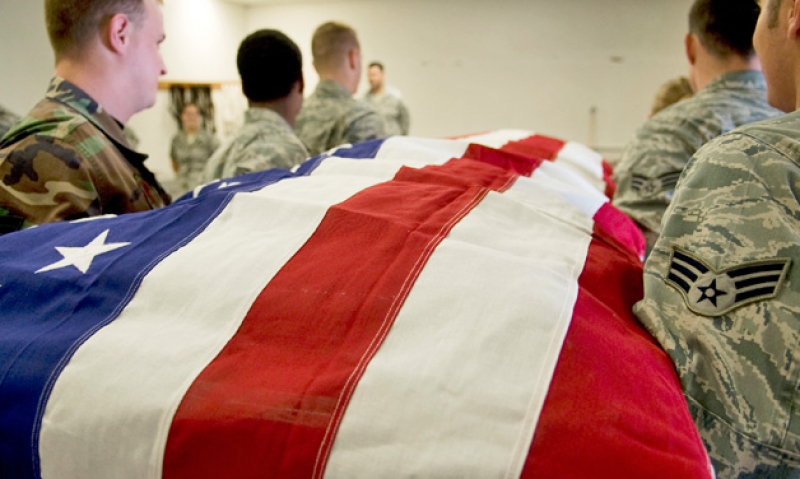
Greatest effect may be on veterans working in defense jobs.
The negative effects of current federal fiscal realities on military veterans were reiterated and amplified in a congressional hearing on Mar. 13. Witnesses from the U.S. Army, Navy, Air Force, Marines and the Pentagon appeared before the House Armed Services Committee’s Subcommittee on Military Personnel to address the "Impact of the Continuing Resolution, Sequestration, and Declining Operations and Maintenance Budgets on Military Personnel and Family Related Programs."
Assistant Defense Secretary Jonathan Woodson reviewed points made by Defense Secretary Chuck Hagel and Assistant Secretary Ashton Carter during a recent press conference, noting that, "In order to address the severe across the board cuts, the Department (of Defense) has … implemented a civilian hiring freeze and has begun releasing temporary and term employees."
According to Woodson’s testimony, "These actions put the department further at risk of competency gaps and critical skill shortages in mission critical activities. In (fiscal year) 2012, the department hired almost 60,000 new employees. Of these … approximately 47 percent were veterans, a community with unique skills sets valuable to the department.
"The loss of these skill sets will have devastating effects on communities throughout the country. These hiring freezes and furlough(s) will also place added stress on the remaining civilian workforce to ‘do more with less,’ the same … workforce that will be furloughed and taking a 20-percent pay reduction."
Deputy Chief of Naval Operations Vice Adm. Scott Van Buskirk also spoke of budgetary impacts on veterans. "Currently, veterans comprise more than 57 percent of the Department of the Navy’s civilian workforce," he said. "In FY 2012, we hired nearly 11,000, including over 2,500 disabled veterans, into the civilian cadre. Given the Navy-wide hiring freeze, the availability of civilian job opportunities, including those for veterans, has come to a virtual standstill. This is severely hampering the department’s ability to recruit a quality and skilled workforce capable of executing our mission."
Van Buskirk did say, however, that the Navy was "determined to take no action that would … limit implementation of programs designed to assist reintegration of sailors leaving active duty under the Veterans Opportunity to Work Act and the Transition Assistance Program."
Army Deputy Chief of Staff Lt. Gen. Howard Bromberg also spoke of military-to-civilian reintegration as his service downsizes by as many as 189,000 soldiers in coming years. "As an Army and a nation, we have a responsibility to ensure that soldiers transitioning out of the Army have the support they need and deserve prior to separating, and are prepared to transition into civilian life," Bromberg said. "Sequestration will not prevent the Army from maintaining service-specific transition-assistance requirements to the more than 130,000 soldiers who transition each year, as mandated by the Veterans Opportunity to Work (VOW) … Act of 2011 and the Presidential Veterans Employment Initiative."
Bromberg did note, however, that sequestration’s impact on the Department of Labor, which has a role in DoD and Department of Veterans Affairs’ transition-assistance services, could compromise the Army’s compliance with the VOW Act.
Bromberg also expressed concern that the Army’s family programs could be affected by funding cutbacks. According to his testimony, "Potential(ly) impacted Army Community Services programs include spouse employment and employment readiness support for the VOW Act initiatives."
While not addressing veterans’ issues specifically, Marine Corps Deputy Commandant Lt. Gen. Robert Milstead brought up the matter of recruitment and retention, citing the necessity to cut back on funds normally set aside for enticing young men and women to join and remain in the Marine Corps, including the maintenance of direct-mail campaigns, websites and call centers.
Air Force Deputy Chief of Staff Lt. Gen. Darrell Jones did address a veterans issue – that of military funerals and related honors, saying, "We estimate that last year Air Force Installation Honor Guards provided honors at nearly 30,000 funerals or memorials. The level of demand for these honors will remain sustained for the next two to five years due to the aging demographics of our veterans. Regardless of sequestration, we will continue to fulfill our sacred duty to provide military funeral honors for our active-duty, retiree and veteran communities."
He went on to issue a caveat, however, noting that, "Our honor guards are composed of airmen who volunteer for this honorable duty and are taken from units without any backfill, thus impacting the primary mission of their owning units. Further, sequestration … could greatly restrict our ability to restock supplies as they are expended … and may hinder our ability to render honors with the professional polish we expect."
The Army’s view of funeral honors in the face of fiscal uncertainty was contained in written testimony Bromberg submitted to the subcommittee. "(This) places casualty and mortuary missions at unacceptable risk," he wrote. "Military funeral honors may be delayed for soldiers and veterans. Additionally, survivors may not receive casualty assistance, benefits or financial counseling on certain days (due to furloughs)."
Other sequestration worries expressed in answer to questioning by subcommittee chair Rep. Joe Wilson, R- S.C., and his colleagues included the funding of wounded warrior support initiatives such as advancement of health care research and development. Marine Lt. Gen. Milstead summed up the mutual concern of subcommittee members and hearing witnesses that "mission critical programs" will be compromised by sequestration, as well as extended operation under the current continuing resolution, which is Congress’ stopgap funding measure in lieu of an adopted federal budget.
- Legislative

